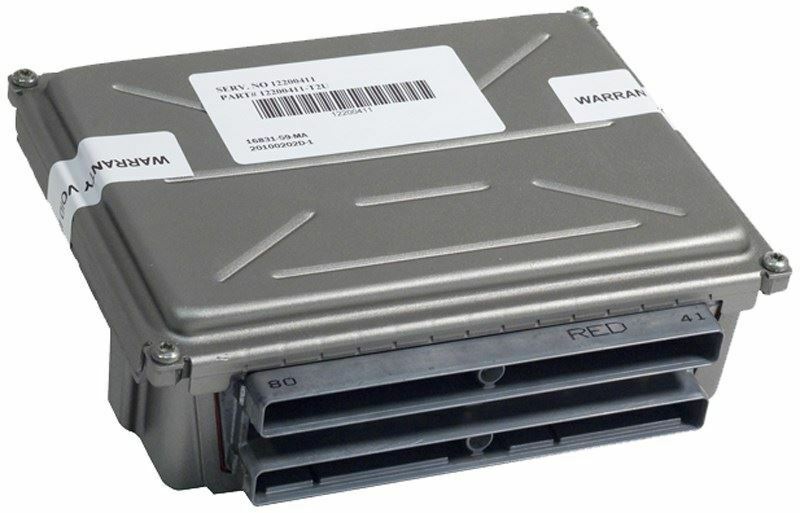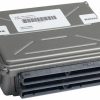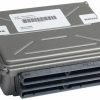Restore Peak Performance and Drive with Confidence
Is your truck or SUV suffering from baffling electrical gremlins, a persistent check engine light, or frustrating performance issues? A failing Powertrain Control Module (PCM) is often the hidden culprit behind problems that can sideline your vehicle and your confidence. This replacement PCM, service number 12586242, is the definitive solution to get your vehicle running like it just rolled off the factory floor. We take the guesswork and hassle out of the repair by professionally programming the module to your vehicle’s unique VIN before it even ships. This ensures seamless communication between components and restores the precise performance engineered by GM.
An Expert’s Diagnostic Tale
I once had a customer with a 2004 Sierra who was at his wit’s end. He’d replaced O2 sensors, the MAF sensor, and even the throttle body chasing an intermittent stalling issue and poor fuel mileage. No codes pointed directly to the computer. After checking all the wiring, I hooked up a scope and saw the PCM’s 5-volt reference signal was fluctuating wildly under load. We swapped in a VIN-programmed module, and it was like a different truck. He called a week later just to say how much he was enjoying his smooth, worry-free drive again. Sometimes, the problem lies with the conductor of the orchestra, not the individual instruments.
Warning Signs Your PCM Needs Attention
The PCM is the central command for your engine and transmission. When it begins to fail, the symptoms can be widespread and confusing. Here are the most common indicators that your module is the source of the problem:
- ✔ Illuminated Check Engine Light: Particularly for internal module failure codes like P0601, P0602, P0604, or P0606.
- ✔ Engine Stalling or Misfiring: The engine may cut out unexpectedly while driving or run rough.
- ✔ No-Start or Hard-Starting: The engine cranks but refuses to start, or takes an unusually long time to fire up.
- ✔ Poor Fuel Economy: A sudden and unexplained drop in your vehicle’s MPG.
- ✔ Erratic Transmission Shifting: Harsh shifts, delayed engagement, or getting stuck in a gear.
- ✔ Communication Errors: Your mechanic’s diagnostic scanner is unable to communicate with the PCM.
Guided Installation for a Lasting Fix
Replacing your 2004 SSR PCM is a straightforward job you can tackle with basic hand tools. Follow these steps for a successful installation and feel the satisfaction of a job well done.
- Safety First: Disconnect the Battery. Always disconnect the negative battery terminal and secure it away from the post to prevent any electrical mishaps.
- Locate Your Old PCM. On these GM models, it’s typically found in the engine bay, either next to the air filter box or under the battery tray on the driver’s side.
- Disconnect the Harnesses. Carefully unlatch and remove the large electrical connectors. Inspect them for any corrosion or bent pins before setting them aside.
- Remove the Old Module. Unbolt the PCM from its mounting bracket and remove it from the vehicle.
- Install the New Module. Seat your new, pre-programmed PCM into the bracket and secure it with the mounting bolts.
- Reconnect Everything. Firmly plug the electrical harnesses back into the new module until they click into place. Reconnect your negative battery terminal.
- Perform Security Relearn. Your vehicle’s anti-theft system needs to sync with the new PCM. This simple “key-on” procedure typically takes about 30 minutes to complete and instructions are readily available online for your specific model.
Pro-Tip for a Smooth Swap
Before disconnecting the electrical harnesses from your old PCM, take a moment to clean the surrounding area with compressed air or a brush. This prevents dirt and debris from falling into the sensitive connector pins, which could cause poor connections and future headaches. A clean connection is a happy connection!
Guaranteed Fitment for Your Vehicle
This module is a direct-fit replacement for a wide range of 2004 GM vehicles. It is compatible with units bearing service numbers 12586242, 19299226, 89017738, YFKD, YFKF, YFKH, YFKJ, YFKX, YFXL, YFXM, YFXN, YFXP, or YHTN. Please verify the number on your existing module to ensure perfect compatibility.
This part is confirmed to fit the following 2004 models:
- Cadillac Escalade, ESV, EXT
- Chevrolet Avalanche 1500
- Chevrolet Silverado & Sierra 1500, 2500, 3500 (Gasoline)
- Chevrolet SSR
- Chevrolet Suburban & Yukon XL 1500, 2500
- Chevrolet Tahoe & GMC Yukon
- Chevrolet Trailblazer EXT & GMC Envoy XL/XUV (5.3L)
- GMC Sierra Denali
- Hummer H2
- Isuzu Ascender (5.3L)
- Buick Rainier (5.3L)
Frequently Asked Questions
Do I need to have this PCM programmed?
No, you don’t! That’s the key benefit of our service. We flash the module with the latest GM software updates using the VIN you provide during checkout. This ensures it’s ready for installation right out of the box, saving you a costly trip to the dealership.
What is the security relearn procedure?
The security relearn, or VATS relearn, syncs your vehicle’s anti-theft system with the new PCM. It’s a simple procedure you can do yourself. It typically involves turning the key to the ‘ON’ position for 10-15 minutes, then ‘OFF’, and repeating this cycle three times. Specific instructions for your model are widely available online.
Where do I find my vehicle’s VIN?
Your 17-digit Vehicle Identification Number (VIN) can be found on your vehicle’s registration, insurance card, or on a small plate on the driver’s side of the dashboard, visible through the windshield.
Will this fix my vehicle’s problem for sure?
While this 2004 SSR PCM is the correct solution for the symptoms and codes listed, a vehicle is a complex system. We always recommend a proper diagnosis by a qualified mechanic to confirm the PCM is the root cause of your issue before purchasing.
What if my original service number is not on your list?
If your part number is not listed, please contact us with your vehicle’s VIN and the number from your original module. We will be happy to verify compatibility or help you find the correct part for your specific application.


